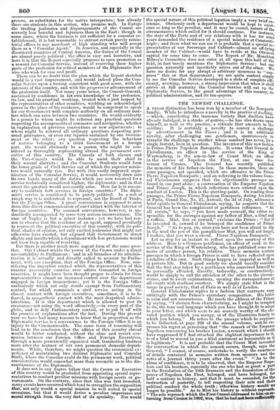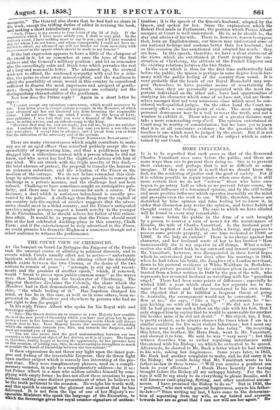THE NEWEST CHALLENGE.
A niesn distinction has been won by a member of the Bonaparte family. While he introduces a novelty in the practice of duelling, —which, considering the immense variety that duellists have already indulged, is a stroke of genius,—he has also drawn upon himself, as well as the practice, a ridicule that amounts to the sublime. It is certainly a novelty to convey a challenge by advertisement in the Times ; and it is an additional novelty, after challenging one gentleman, spontaneously to transfer the challenge to another whose conduct has never, for a single instant, been question. The inventor of this new fashion is Prince Pierre Napoleon Bonaparte. It seems that General de Fleischmann, an officer in the service of the King of Wurtemberg, is the son-in-law of Count Miot, an officer in the service of Napoleon the First, at one time Go- vernor of Corsica. The GLneral has recently published the memoirs of his father-in-law. In these memoirs, there are some passages, not specified, which are offensive to the Prince Pierre Napoleon Bonaparte ; and on referring to the volume Gene- ral Fleisehmann supposes that the objectionable passages are found in one part alone ; a conversation of the Emperor Napoleon and Prince Joseph, in which reflections were uttered upon the conduct of Lucien. This is the starting-point. On reading these passages, the Prince Pierre Napoleon Bonaparte, dating his letter at Paris, Grand Rue No 27 Auteuil, the 3d of July, addresses a
• 7
brief epistle to General Fleischman saying, he suspects that the General has been the complaisant ef perfidious influences. "At all events," he says "you have made yourself, the editor re- sponsible for the outrages against my father of Miot, a thief and a ruffian. Mint, liar or coward," exclaims the Prince ; "liar if he invented it, coward if he 'betrayed the confidence of Prince Joseph." "As to you, sir, since you have not been afraid to dip in the mud the pen of the pamphleteer Miot, you will not forget, I reckon, that you wear a sword. Pierre Napoleon Bonaparte." Let us stop for an instant to reflect upon the courtesy of this address. Here is a German gentleman an officer of rank in the service of the King of Wurtemberg, wilco has published some me- moirs of another person, his relative. These memoirs contain passages in which h foreign Prince is said to have reflected upon a relative of his own. Such things happen in imperial as well as in private life. But in good society we should usually consider that the first step taken by a gentleman who conceived himself to be personally offended, directly, indirectly, or constructively, would be simply to call the attention of the other to the circum- stance, arid to await explanations, opening the correspondence at all events with studious courtesy. We simply state what is the usage in good society, that of Paris as well as of London.
General Fleischruann replies in a fashion that contrasts very strikingly with the Prince's epistolary composition. His letter is calm and not nneourteous. He meets the address of the Prince by_saying, " abstain from characterizing, as I might be tempted to do, the tone and language which you have thought fit to adopt in your letter, and which seem to me scarcely worthy of the eie- -vated position which "you occupy, or of the illustrious family to which you belong." e refers to the passage which he supposes to be indicated, at page 238 of the second volume, and he ex- presses his regret at perceiving that "the remark of the Emperor Napoleon concerning his brother Lucien, a eemark which I should have suppressed if I had attached the slightest importance to it, is of a kind to wound in you a filial sentiment as honourable as it is legitimate." It is not probable that the Count Miot invented the conversation in which the remark occurs, though, says the General, "I cannot, of course, undertake to verify the exactness of details contained in memoirs written from memory and the notes of a journal thirty years after the event." "As to the abuse of confidence, it is to be observed, that the Emperor Napo- leon and his brothers, espeomlly the one who had so great a part
in the Revolution of the 18th Brumaire and the foundation of the power of Napoleon the First, belonged, and have belonged, for half a century to history, and that it must be conceded, for the instruction of posterity, to tell respecting their acts and their political conduct the whole truth ; otherwise history would no longer be possible." As to Idiot his history is without reproach.
"The sole reproach which the First Consul addressed to him on re-
that he had not been sufficiently energetic." The General also shows that he had had no share in the work, except the trifling duties of editor in revising the book, and making a Short introductory notice.
"Such Prince, is my answer to your letter of the 3d of July. If the explanation which I have made satisfy you, I shall be very glad. In the contrary event, I have nothing more to say to you ; and if I have wounded any one whom I do not know, and whom consequently I could not have in- tended to offend, my advanced age will not hinder me from answering with empressement to the appeal which should be made to my honour." If the last expression appears to have a little of the clangour of the sword in it, let us remember at once the tone of the first address and the General's military position and let us remember also the exceedingly calm and frank tone which pervades the rest of a long and reasonable letter. The advanced age, the avowed wish not to offend, the confessed sympathy with zeal for a rela- tive, the pains to`clear away misconception, and the readiness to admit the possibility of error, would in this country be considered sufficient to disarm the most impetuous and arrogant of gentle- men ; though impetuosity and arrogance are certainly not the distinguishing 'characteristics of the gentleman.
Now how does the Prince reply? Again in a short letter he
says— "I cannot accept any epistolary- controversy, which would moreover be idle. Your letter goes to correct certain passages in the Memoirs, of which vour advanced age has not hindered you from becoming the responsible iditor. I did not know this age when I wrote. At the house of Levy, your publisher, I was told that you were a General of the Wurtemberg army, in active service, cud an aide-de-camp to the King. "However that naay be, you are ready, you tell me, to give me satisfac- tion. I sustain then my first letter. In any ease you have a son who can take your place. I accept him in advance, and I await from you or from him the indication of the adversary and of the seconds.
PIERRE NAPOLEON BONAPARTE."
There are many circumstances which might contribute to make any son of an aged officer thus assaulted publicly accept the re- sponsibility of representing him, and thus a gentleman may be dragged into a ridiculous contest with a person whom he did not know, and who never has had the slightest relations with him of any kind. We are struck with the triple novelty of this duel,— the total absence of pretext, the proposal to transfer the honour to an unknown substitute, and the selection of the Times as the medium of the outrage. We do not before remember this chal- lenge by advertisement, when it was quite possible to convey the challenge in a private manner, and the challenge had not been refused. Challengers have sometimes sought an anticipative pub- licity, and there may be many reasons for such a course. For instance, a duel which is notorious beforehand is usually: pre- vented by the police. A challenge thus flung from the capital of one country into the capital of another suggests that the adver- saries should meet in a third country, and the Prince's antiquated novelties might perhaps surest a fourth novelty to the younger M. de Fleischmann, if he should relieve his father of this ridicu- lous affair. It would be to propose that the Prince should meet him at the last celebrated duelling-place in this country, Chalk Farm ; and if the entertainment be duly advertised in the Times, we could promise his dramatic Highness a numerous though not a select audience to witness the performance.



























 Previous page
Previous page